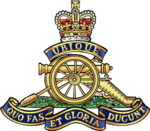Royal Canadian Horse Artillery Band
| The Royal Regiment of Canadian Artillery | |
|---|---|

Badge of the Royal Canadian Artillery
|
|
| Active | 1883–present |
| Country |
|
| Branch |
|
| Type | Artillery |
| Motto(s) | Ubique (Everywhere) and Quo fas et gloria ducunt (Whither right and glory lead) |
| March |
|
| Commanders | |
| Captain General | Elizabeth II |
| Location | CFB Shilo, P.O. Box 5000, Stn Main, Shilo, Manitoba, Canada |
|---|---|
| Type | Artillery Museum |
The Royal Regiment of Canadian Artillery (French: Le Régiment royal de l'Artillerie canadienne) is the artillery personnel branch of the Canadian Army.
Many of the units and batteries of the Royal Regiment of Canadian Artillery are older than the Dominion of Canada itself. The first artillery company in Canada was formed in the province of Canada (New France) in 1750.
Volunteer Canadian artillery batteries existed before 1855 but their history is mostly unknown. Seven batteries of artillery were formed after the passage of the Militia Act of 1855 which allowed Canada to retain a paid military force of 5,000 men. One of the pre-1855 volunteer batteries formed in Saint John, New Brunswick, in 1793 was called the “Loyal Company of Artillery” and exists today as the 3rd Field Artillery Regiment, RCA.
On 20 October 1871, the first regular Canadian army units were created, in the form of two batteries of garrison artillery; thus, that date is considered the regiment's birthday. "A" Battery in Kingston, Ontario, and "B" Battery in Quebec City, Quebec, became gunnery schools and performed garrison duties in their respective towns. They are still active today as part of the 1st Regiment, Royal Canadian Horse Artillery.
The Royal Canadian Artillery has participated in every major conflict in Canada's history.
During the war in South Africa, Canada contributed the Brigade Division of the Canadian Field Artillery. It consisted of three batteries, named "C", "D" and "E", each of six 12-pounder field guns. Each battery consisted of three sections of two guns each, and was manned by a core of Permanent Force soldiers, with additional members from the Militia. The militia for "C" and "D" batteries came from Ontario and Winnipeg, while "E" battery had militia from Quebec, New Brunswick, and Nova Scotia.
...
Wikipedia
